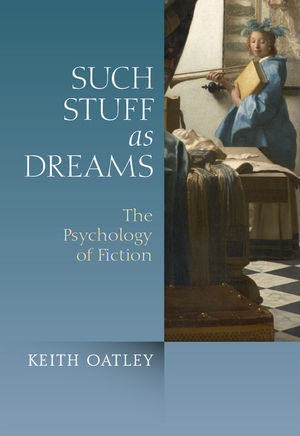Such Stuff as Dreams: The Psychology of FictionISBN: 978-0-470-97457-5
Paperback
304 pages
July 2011
 This is a Print-on-Demand title. It will be printed specifically to fill your order. Please allow an additional 10-15 days delivery time. The book is not returnable.
|
||||||
“Such Stuff as Dreamsis a remarkable book in several ways. It stands out by the breadth of the topics covered, extending beyond the reader to also include the writing and the communication about fiction, and by the diversity and richness of the many different concepts and studies brought to bear upon the topic.” (JLTonline, 1 July 2014
Review copy sent on 29.05.14 to PsycCRITIQUES
Featured in The Scotsman
- 25 July 2011
Featured in The Yorkshire Post - 23 August 2011
Featured in The Guardian - 22 July 2012
Featured in The Independent - 28 August 2012
Featured in The Globe & Mail - 9 September 2011
BBC Radio 4 interview - 7 July 2012
Featured in Times Literary Supplement - 30 March 2012
"Such Stuff as Dreams is a welcome and well-informed foray into a neglected research area. As someone who has thought very hard about the making of fiction as well as the creative engagement with it, Oatley is an excellent guide to the science of an art form whose value, in this brave new world of cognitive neuroscience, is undiminshed. His claim is that fiction, like other art forms, allows us to experience emotions in new contexts, and thus learn more about these emotions and ourselves. His achievement is to show us the many ways in which this is true." (The Psychologist, April 2012)
"Summing Up: Highly recommended. Lower-division undergraduates through faculty; general readers." (Choice, 1 January 2012)
"Fiction, according to this cognitive psychologist, is a "dream" or mental "model" or "simulation", and now its effects can be probed with modern scientific techniques . . . Oatley explains with enthusiasm the results of his and others' experiments on readers." (The Guardian, 22 July 2011)
"Keith Oatley's book asks why we read, and what happens to our mind when we do. It is a winning combination of psychology, literary criticism and speculation." (The Scotsman, 30 July 2011)
Review in The Times and The Sunday Times e- paper - 12/07/11.
"Much of the discussion is compelling, and this book could well change the way you read . . . Still, his writing is entertaining and he's tapping into a rich vein, and I hope he will explore the subject further." (New Scientist, 23 July 2011)?
This is the book on emotion and literature that we have been waiting for. Oatley’s perceptive review of the field and the numerous insights of his own that he develops make this book the richest and most intriguing to appear in a decade. It will be essential for anyone interested in the processes of literary reading. Written in deceptively simple and elegant prose, accommodating all the complexities within the field and beyond it, Oatley transports his reader from literature to psychology, from Shakespeare to children’s theory of mind, from Eisenstein’s film practices to the theories of ancient Indian poetics. All these topics and more contribute to illuminating the transformative power of literary fiction for the reader.—David S. Miall, Professor of English & Film Studies and Adjunct Professor of Comparative Literature, University of Alberta, Canada
Like the best fiction, this insightful book illuminates
fundamental truths about our minds, relationships, emotions,
creativity, and how these come together to form stories with
lasting impact. It is an engaging, wide-ranging, and
scientifically-grounded journey from fiction’s roots in
childhood through its continuing role in our lives. Professor
Oatley is the perfect guide through the psychology of fiction: he
combines the deep expertise of a scholar and the passion of a
lifelong reader with a writer’s touch. This book is a
delightful and thought-provoking read for anyone interested in
literature, how it works, and why it is so important to the human
experience.
—Melanie C. Green, Professor of Psychology,
University of North Carolina, USA



